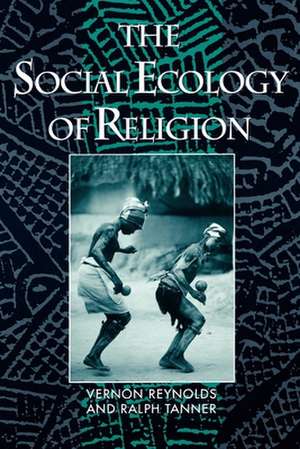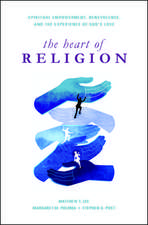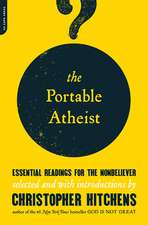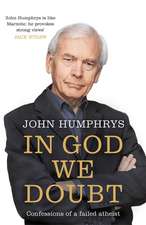The Social Ecology of Religion
Autor Vernon Reynolds, Ralph Tanneren Limba Engleză Paperback – mar 1995
one sixth of all brides in English rural parishes between the late sixteenth and early nineteenth centuries pregnant at marriage, and what does this tell us about Christian practices during that period?
No society exists in which religion does not play a significant part in the lives of ordinary people. Yet the functions of the world's diverse religions for human beings have never been fully described and analyzed, nor has the impact of adherence to those religions on the health and survival of the
populations that practice them. A completely updated and revised edition of The Biology of Religion, published in 1983, this extraordinary text reveals how religions in all parts of the world meet the needs of ordinary people and frequently play an important role in helping them to manage their
affairs. Reynolds and Tanner show that religions have down-to-earth functions in the control and management of the main events of the human life-cycle--birth, marriage, death, and the events in between. Surveying the beliefs and practices of Christianity, Judaism, Islam, Hinduism, Buddhism,
Shintoism, and many others, and how these religions concern themselves with major issues such as abortion, sex in and outside marriage, divorce, and sickness, the authors demonstrate a world-wide concern by religions for these important issues. They attribute this concern to the need all human
beings have for guidelines to behavior during the most important times of life. Supported by a wealth of scientific data and examples, and generously illustrated throughout, this unique text makes a vital contribution to courses in anthropology and comparative religion.
Preț: 604.62 lei
Preț vechi: 785.22 lei
-23% Nou
Puncte Express: 907
Preț estimativ în valută:
115.73€ • 125.75$ • 97.28£
115.73€ • 125.75$ • 97.28£
Carte tipărită la comandă
Livrare economică 21 aprilie-05 mai
Preluare comenzi: 021 569.72.76
Specificații
ISBN-13: 9780195069747
ISBN-10: 0195069749
Pagini: 336
Ilustrații: frontispiece, line drawings, tables
Dimensiuni: 156 x 234 x 18 mm
Greutate: 0.47 kg
Ediția:Revised
Editura: OXFORD UNIV PR
Locul publicării:New York, United States
ISBN-10: 0195069749
Pagini: 336
Ilustrații: frontispiece, line drawings, tables
Dimensiuni: 156 x 234 x 18 mm
Greutate: 0.47 kg
Ediția:Revised
Editura: OXFORD UNIV PR
Locul publicării:New York, United States
Descriere
What effect does the Islamic attitude to abortion have upon the family size and growth of Muslim populations? How do the Sukuma people of Tanzania react to the birth of an abnormal child, and why do their reactions differ so radically from those of Roman Catholics in Pennsylvania? Why were one sixth of all brides in English rural parishes between the late sixteenth and early nineteenth centuries pregnant at marriage, and what does this tell us about Christianpractices during that period?No society exists in which religion does not play a significant part in the lives of ordinary people. Yet the functions of the world's diverse religions for human beings have never been fully described and analysed, nor has the impact of adherence to those religions on the health and survival of the populations that practice them. A completely updated and revised edition of "The Biology of Religion", published in 1983, this extraordinary text reveals how religions in all parts of theworld meet the needs of ordinary people and frequently play an important role in helping them to manage their affairs. Reynolds and Tanner show that religions have down-to-earth functions in the control and management of the main events of the human life-cycle - birth, marriage, death, and the events inbetween. Surveying the beliefs and practices of Christianity, Judaism, Islam, Hinduism, Buddhism, Shintoism and many others, and how these religions concern themselves with major issues such as abortion, sex in and outside marriage, divorce, and sickness, the authors demonstrate a world wide concern by religions for these important issues. They attribute this concern to the need all human beings have for guidelines to behaviour during the most important times of life. Supported by a wealth ofscientific data and examples, and generously illustrated throughout, this unique text makes a vital contribution to courses in anthropology and comparative religion.ABOUT THE AUTHORS: Vernon Reynolds teaches Biological Anthropology at Oxford University and is a Fellow of Magdalen College, Oxford. He is the author of The Biology of Human Action (Second Edition, 1980), Primate Social Behavior (with D. Quiatt, 1993), and Survival and Religion (edited with E.L. Jones, 1995).Ralph Tanner, now retired, for many years taught religious sociology at Makerere University, Uganda, and at London University. He is the author of Transition in African Beliefs (1967), Homicide in Uganda (1970), and Three Studies in East African Criminology (1970).
Recenzii
this study is both a remarkable demonstration of a certain intellectual 'colonialism' and - in its last paragraph - a witness to the probable failure of the central thrust of its own position
this book again offers a unique and fascinating perspective on religiion which is a delight to read ... Accessible and rewarding to those both with and without a detailed knowledge of the major religions, this book is highly readable ... this is a fascinating and valuable text for both biological and social anthropologists alike.
this book again offers a unique and fascinating perspective on religiion which is a delight to read ... Accessible and rewarding to those both with and without a detailed knowledge of the major religions, this book is highly readable ... this is a fascinating and valuable text for both biological and social anthropologists alike.















